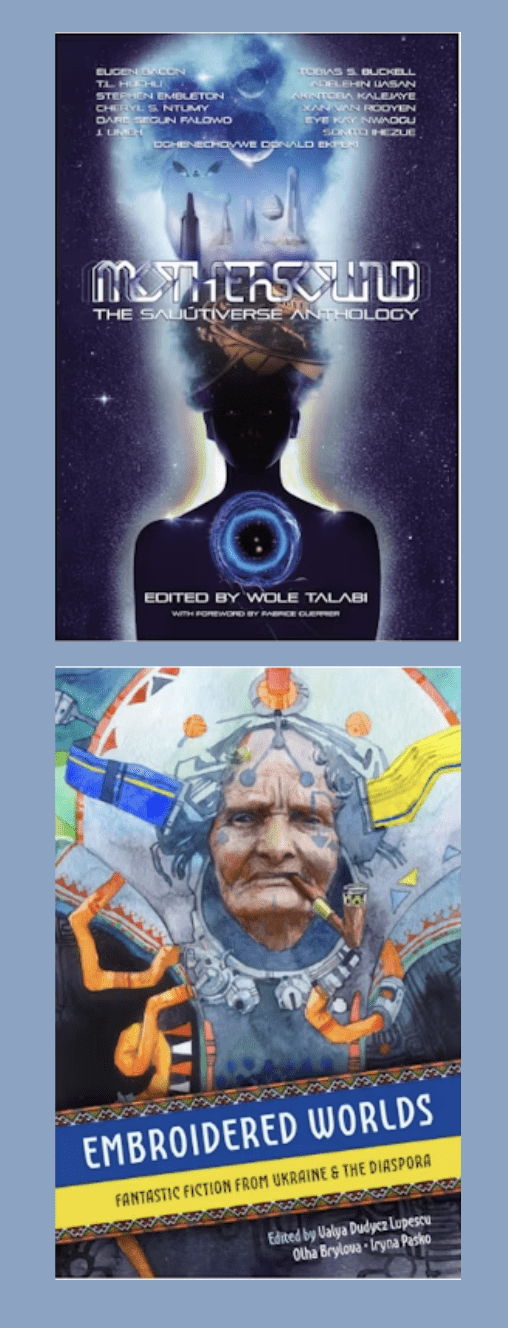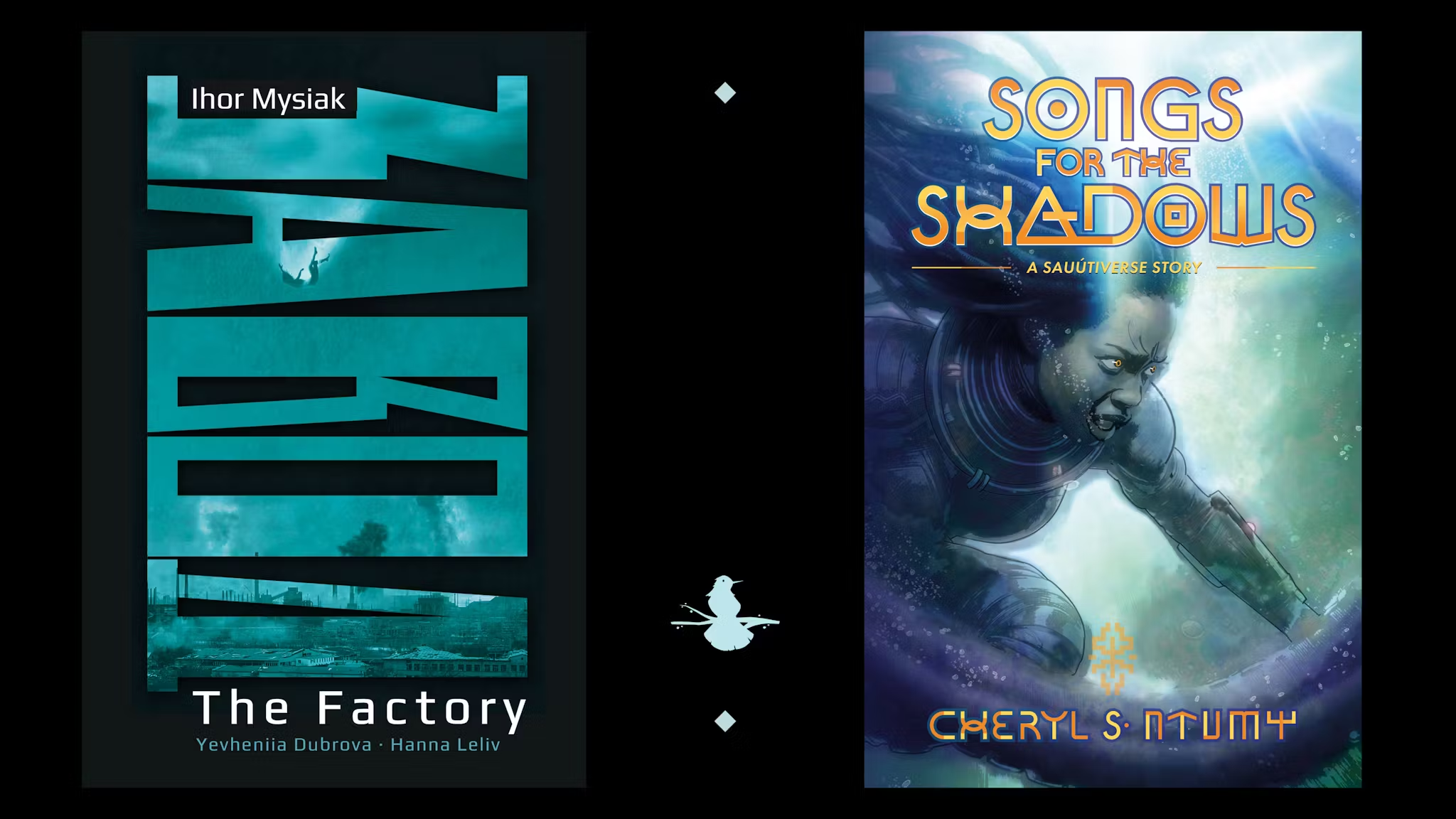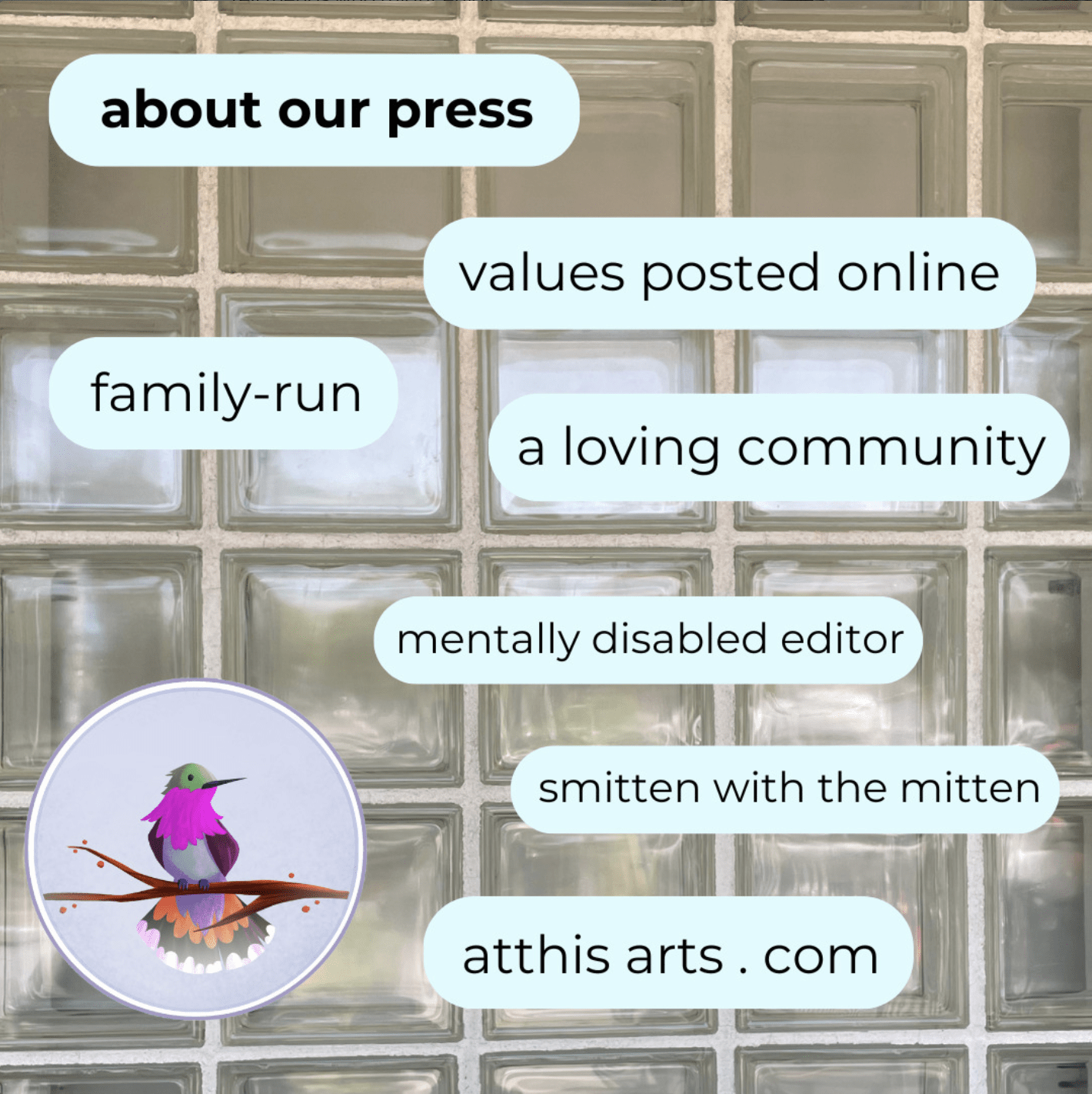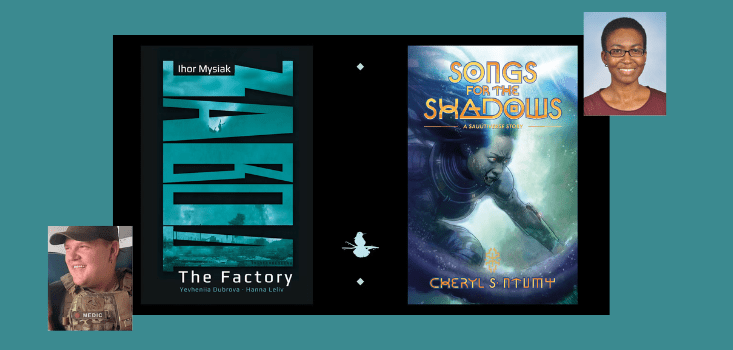E.D.E. Bell of Atthis Arts – a small independent publisher based out of Detroit, USA and new BFS member – tells us why they’ve opted to crowdfund for two very important new releases celebrating a late Ukrainian writer and a member of the Sauútiverse. It’s a case of, Bell says, “how the universe sometimes finds ways to bring people together, even across extraordinary distances or circumstances, to bring dreams and needs to life.”
Why have you opted to use Backerkit for these releases?
Our small press is still working to be seen more broadly, and often in those situations, books might gather views over time. Given the time-sensitivity associated with both of these wonderful and important books, my main concern was finding ways to make sure people knew about the pre-orders. Sites like BackerKit provide access to a broader community of art supporters, as well as to tools that make communicating and fulfilling the orders more efficient. I would also like to say that the publishing teams at sites like BackerKit and Kickstarter are made of wonderful people, who really care about independent art and opportunities. I see them and I’m grateful to them.
One author is from Ukraine, who died defending his home; the other from Ghana, with the novella the first published in the Sauútiverse. These are two very different worlds, yet two underrepresented worlds in Western publishing. How did you come across them?
I have found that when you reach out to the world, the world reaches out to you, and I think that, far beyond publishing, this is the truth—the kinship of Earth—that will save us.

In the case of Ukrainian fiction, we were approached by a Ukrainian-Canadian writer in 2022 in Ottawa, looking for any press that might step in to assist with a collection of stories that had struggled to find footing in the months after Russia’s most recent invasion. (Yes, for any who saw that fleeting story, we famously “shredded the checkâ€, and if you don’t know, don’t worry about it, just know the project went through a lot.) Over the following 14 months, we worked with a broad international community to make that book, which evolved into the awesome Embroidered Worlds—edited by Valya Dudycz Lupescu, Olha Brylova, and Iryna Pasko—a reality. It was a difficult project and had impacts on several other efforts, but we were so glad to have some small way to Stand with Ukraine and elevate their beautiful culture and storytelling. Finally past the project and looking for some needed stabilisation, I received an email regarding works available for translation, but with a time-pressing need to apply for the Translate Ukraine program, if we were interested. I just didn’t think it was something we could do, but as I told Chytomo, I immediately connected with this book. It was a significant strain for our press, family, and community to take this project on, but I really felt I needed to.
(Pictured: the two anthologies that gave rise to the two campaign books)
In the case of the Sauútiverse, you know, I don’t even know if I should tell this story, but let’s do it. The Science Fiction and Fantasy Writers Association (SFWA) was doing its annual auction, and again, I knew we did not have money to bid. However, I saw that Wole Talabi, who I’d seen talked about with respect by people who I respect, had a meet and greet type virtual session with no bids. I just thought, that’s offensive, so I put in the minimum bid, hoping that people would come in and bid it up. When I won the spot, I told Chris, who was pretty annoyed, and gave me a speech explaining how these things add up and if we want to keep the business going, and on and on. (I get it.) Well, let me tell you, that was the best 20 bucks I’ve ever spent. I’d like to think Wole and I hit it off? I loved hearing about his work, his philosophy, his dad and “the carâ€, and when he told me (and the other writer there) about the Sauútiverse, I was losing my whole mind. It was so…cool. On every level. I hesitated to be so bold, but later I reached out and just said, anything I or my press can do to help, even, uh, publishing, you let me know, and he said…actually I might have something perfect. This resulted in my reading of Cheryl’s novella, and when Cheryl also seemed happy to work with us, I was just, well, thrilled. And now Wole’s writing is on my must-read list; he’s awesome on every level.
In both cases, I mention these impulsive connections with some sort of spiritual-sounding defence. I’m a trained engineer without a theistic view on life. But one thing I’ve really started to believe in, that can be explained by really any faith or science one holds, is how the universe sometimes finds ways to bring people together, even across extraordinary distances or circumstances, to bring dreams and needs to life. A Nishinaabe elder friend of mine who has found much solace in Christianity told me that in times of need, Earth’s spirits find ways to guide people together who need each other. I have seen this expressed so many ways in metaphors of paths and rivers, and, whether movement of the hands comes from guidance, insight, or chance—I’m grateful for a world where such connections exist. (And very grateful for the conventions and associations that enable them for people like me, who struggle a lot in finding social connections.)
You’ve got lofty goals for the number of backers – 2500 – as you say these books are “good and important and historically significantâ€. Tell us more about the books and why you believe in them so much.

Yes! I am still getting side-eyes for the 2500 pre-orders / backers goal, and I still stand by it. All it takes is some visibility or a popular voice, and momentum goes from there. Again, our primary goal with this campaign is to get these books seen. (With many very important consequences, but still, that’s the goal.)
Since you have quoted me in all my elegance (*grins*), let’s go through each of my hand-waves.
Songs for the Shadows by Cheryl S. Ntumy (pictured)
It’s good: I love Cheryl’s storytelling style. It’s flowing but with an edge. Shad-Dari is a wonderfully interesting and real-feeling character, not the hero or villain of a story, but a person navigating a world that sometimes operates in those extremes all around us. As a founding member of the Sauúti Collective, Cheryl feels the worlds she is writing in, and takes the reader along to experience them. I truly believe Cheryl is moving on to many more amazing, super-cool things, and will be a name you will hear for a very long time.
It’s important: This beautiful novella is important in several ways. First, African Literature remains directly and specifically and severely underrepresented in English language publishing, which is pretty offensive considering that Africa has about three times the population of Australia, Canada, the United Kingdom, and the United States combined. Reading and talking about African literature is one way to address that imbalance, which has real consequences for real people. On top of that, this book has intersectionality with Black fiction and queer fiction, both of which are very much under attack by book banners and their circles. It’s also thematically important. A book on life and grief and time, told gently and without toxic positivity or easy solutions. A book of family and culture and kindness and reality. I really do believe in times of broad cultural mental health crisis, these are stories we absolutely need. And of course, this book is important to the career and livelihood of a writer that I assure you will be a star.

It’s historically significant: This is the first published novella in the Sauútiverse world, which if you haven’t heard of it yet in the broader world of genre and entertainment, I promise that you will. And for collectors, having a pre-ordered copy will surely be a very cool item for any Sauúti collection. (And don’t miss the next novella, The Nga’phandileh Whisperer by Eugen Bacon from Stars and Sabers Publishing in 2025.)
The Factory by Ihor Mysiak (pictured), translated by Yevheniia Dubrova and Hanna Leliv

It’s good: I will tell you now that this book will not be for everyone (I prefer books that aren’t!), but also that I deeply enjoyed it and love it. The book immerses the reader in Ukrainian storytelling, as well as the perspective of a loving poet who has seen colonialism kill people around him, even before it took his own life. And so, in this story, Ihor explores happiness through a contemporary small town setting, but one that is deeply military at its core: the changing of scenes, the constant dilapidation, the lack of answers, the nearly aggressive centering of masculinity. We’re calling it a modern parable to help communicate what the story is truly about, but its messages and metaphors are delightfully not heavy. The story is a wandering exploration of life with what I consider an absolutely brilliant climax, followed by a grotesquely humorous study of death and a wonderfully poetic ending. I’ll be thinking about this story forever.
It’s important: Ukrainian voices are telling me over and over: “Reading our literature supports Ukraine.†And this book, so much this book. First, it was a symbol of hope when it was released, published just weeks after this Russian invasion, and dedicated to Ihor’s friend, Dage, who had just been killed in, yes, a factory—in the Siege of Mariupol. Then all those weeks when Ihor was missing, when a land and culture was praying for his safety, his body was found, taking from the world a man and a writer, and all his future works. Then a year later, to learn that this novel would be translated into English, the book itself sharing Ukrainian culture, the blending of Ukrainian poetry and prose and storytelling of the fantastic, but also the story around it reminding the world of the cost of colonialism, of aggression, of looking away. One name and one face, but one speaking in the presence of atrocities to humanity, those which continue all around our world. Through this book, we see Ihor. We see Ukraine. We see humanity. We see art and defiance and creation and love. We see control and meaning and freedom and joy. This book, to me, is essentially important.
It’s historically significant: To my knowledge, this was the first novel published in Ukrainian after the invasion, and to my knowledge, the first post-invasion novel, of any genre, to be translated from Ukrainian into English. It was written by a man, a poet, a husband, reflecting on all he’d seen and seen lost to Russian aggression in 2014-2015 who then stood again to defend his home, making his first novel his last.
Cheryl’s and Ihor’s books aren’t the only ones in this effort: you have two anthologies as well. How did these come into the campaign?
Both of these anthologies augment the experience of reading the new releases, because they both provided stepping stones to these books, and also because they provide rich context through a wide range of culturally-related storytelling. As I said, we were only connected into the world of Ukrainian storytelling through Embroidered Worlds. And of note, Mothersound, the first book in the Sauútiverse, is published by Android Press. Something I love about small presses is we do not see each other as competition in the least. There is a vast world of readers and a hunger for art and expression, and small presses are here to lift each other. Always.
You’re here representing Atthis Arts, a family-run small independent publisher out of Detroit, and one that is very strong and vocal in its values. What’s it like being an indie publisher backing important works like these? What sort of challenges do you face? And what’s the reward?
As a human, as a publisher, it honestly just feels so basic. Love people, lift art, speak plainly. But we are not at a place where it is treated as basic. Certain things have been hard, and yeah, consequential. But you’ve asked me this delightfully direct question, and I’m sitting here thinking what do I want to do with it, and I think it’s this: Being at trying to do more for several years now, and feeling more downs than ups, I would like people to know that the most frustrating obstacle we’ve run into is not from the corporations or the oppressors, but from those saying they are progressives. The implication that they are non-confrontational, as if acting on values or even standing by them is the opposite. The prioritisation of comfort, but not considering comfort for whom. The silence. The loudness of the silence. Not everyone can do or say the same things, but sometimes, standing by someone is more powerful than anything in the world. Just being there. Being seen there. The power of it is profound. If people see this, and wonder if they could do more to ease this work, I just ask them to reflect on it. I reflect on myself all the time. Giving myself love and grace, but also the vulnerability to know I want to be better, that I can, and that it’s really a beautiful thing about life and time. As fleeting as it is, every new day remains unwritten.
What’s the reward? Being able to look in the mirror and know that I’ve tried. Knowing that lives have been literally saved, and opportunities made through the work of our community. And hoping, quietly and secretly, that maybe even if things don’t work out with the press in the end, something I’ve done has set an example, built a platform, anything that contributed to the long-term of publishing.
Anything else you’d like us to know about the campaign or Atthis Arts?Â
Yes. I want to say and repeat how truly and deeply I feel the gratitude for the people who have joined us and then stayed with us all these years. It’s another subject, but part of the squeeze on creativity is this expectation being put out, I believe intentionally, by Big Media, that art happens big and fast and once. Creatives need to be nurtured. Protected. Loved. And stood by, often for years and years, until their work can bloom. Atthis Arts still exists because of the team, community, family that has grown around it. Believed in this work. Believed in what we are trying to do.
Image from Atthis Arts’s Instagram page (source)

The same, I believe, goes for marginalized groups or underrepresented writing: It’s not a support once thing, it’s a stay with it thing. In whatever ways we’re able to do so.
I can’t see the future. Can’t see how hard it will be, or what else will get thrown—helpful or hindering—in our path. All I can tell you is I’ll never give up, and I’ll always stay grateful.
For now, I invite you to two wonderful events celebrating the release of Songs for the Shadows:
- In London: 16 November 2024: Cheryl S. Ntumy at New Beacon Books, 76 Stroud Green Road, Finsbury Park, N4 3EN, 7:00-9:00 pm.
- Globally: 12 November 2024: Mystery, Meaning & Mortality with Stewart C Baker, Wole Talabi, and Cheryl S. Ntumy (along with guests Holly Lyn Walrath and E.D.E. Bell) – also celebrating the release of The Butterfly Disjunct by Stewart C Baker, published by Interstellar Flight Press – see here for times and/or to set a reminder.
Find out more about the campaign and back it here.


